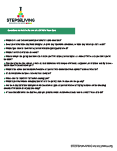Tips for Babysitters

The Babysitter’s Tool Kit
Once you have found the right babysitter, the Babysitter’s Tool Kit is a set of basic resources to leave with the sitter. It contains all the information he or she might need. This tool kit can help you organize all your important information and contacts for your child’s caregivers. Make sure your sitter knows where to find this information and that it is readily accessible with any medications that might be appropriate.
Print out a copy of the Babysitter’s Tool Kit.
When leaving your child with a babysitter or caregiver, always:
- Make sure your work phone, pager, and cell phone numbers are clearly posted, as well as any other instructions on how to reach you
- Leave the telephone and/or cell phone numbers of your child’s doctor
- Leave the phone number of your HTC
- Post all emergency numbers and your house address (include cross streets) in large print near all telephones (this is important information in the event of an emergency call to 911)
- Consider having a trial run of how the caregiver would contact you in case of an emergency
- Make sure the caregiver understands the kinds of situations that would require them to contact you
Communication
Often parents need a few short sentences to explain bleeding disorders to others.
Here is a sample that you can use or adapt for your needs:
To print out a copy of this sample Explanation of Your Child's Bleeding Disorder, click icon:
As important as it is to find the right caregiver for your child, keeping good, open communication with your child’s caregiver is essential.
Here are some tips for on-going communication:
- Ask the caregiver: What did my child do today? How is my child doing? Are there any problems I should know about?
- Voice any specific concerns about your child
- My child just doesn’t seem like him- or herself
- My child is being extra quiet
- My child seems to use one limb more than another
- My child doesn’t want to play
- Never be afraid to ask questions. Asking questions helps you understand more about your child’s needs and the needs, questions, or concerns of the caregiver.
Tips and Resources for Babysitters and Other Caregivers
Taking care of a child with a bleeding disorder might concern you. But, first and foremost, you need to know that a child with a bleeding disorder is like any other child. Children with bleeding disorders like to do things that every other child likes to do. Other than being a bit more vigilant with your oversight and knowing some basic emergency procedures, you can enjoy spending time and doing activities with this child just as you do other children.
Talking to a Parent of a Child With a Bleeding Disorder
The more you know about the child’s disorder and the care involved, the more you will feel comfortable spending time with him or her.
Here are some questions a babysitter can ask parents:
- What do I need to know about your child’s health condition?
- Does your child have any food allergies, require any special medications, or have any other special needs?
- What signs should I look for in your child that might signal a bleed? What should I do if a bleed occurs?
- Where will you be going and how can I reach you? What are your cell phone numbers? When do you think you’ll be back?
- Can you give me the names, numbers, and addresses of a couple of nearby friends, neighbors, or relatives to contact in case I cannot reach you?
- What is the name and contact information of your child’s doctor and Hemophilia Treatment Center (HTC)?
- Under what circumstances should I contact you?
- When should I call 911? When should I call you?
- What is your insurance company and who is the policyholder in case of an emergency?
- Are there any activities that your child cannot do or games your child shouldn’t play because of the bleeding disorder? What kinds of play are okay?
- If I need to administer medication, can you provide written instructions and show me what I’ll need to do?
To print out a copy of the Questions to Ask a Parent, click icon:

